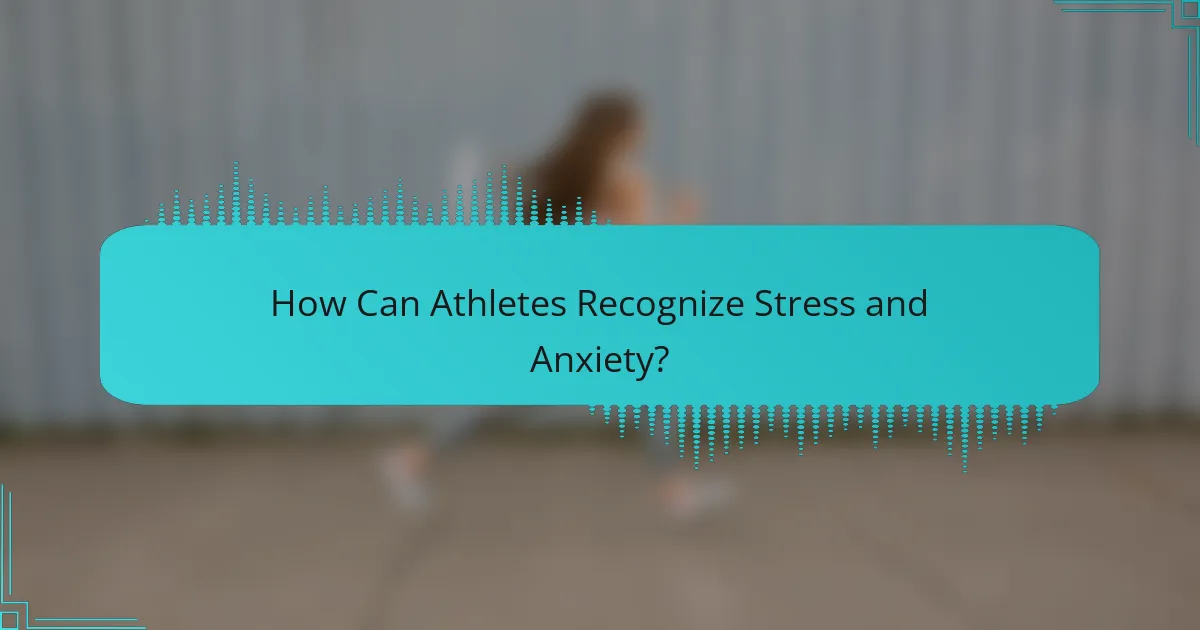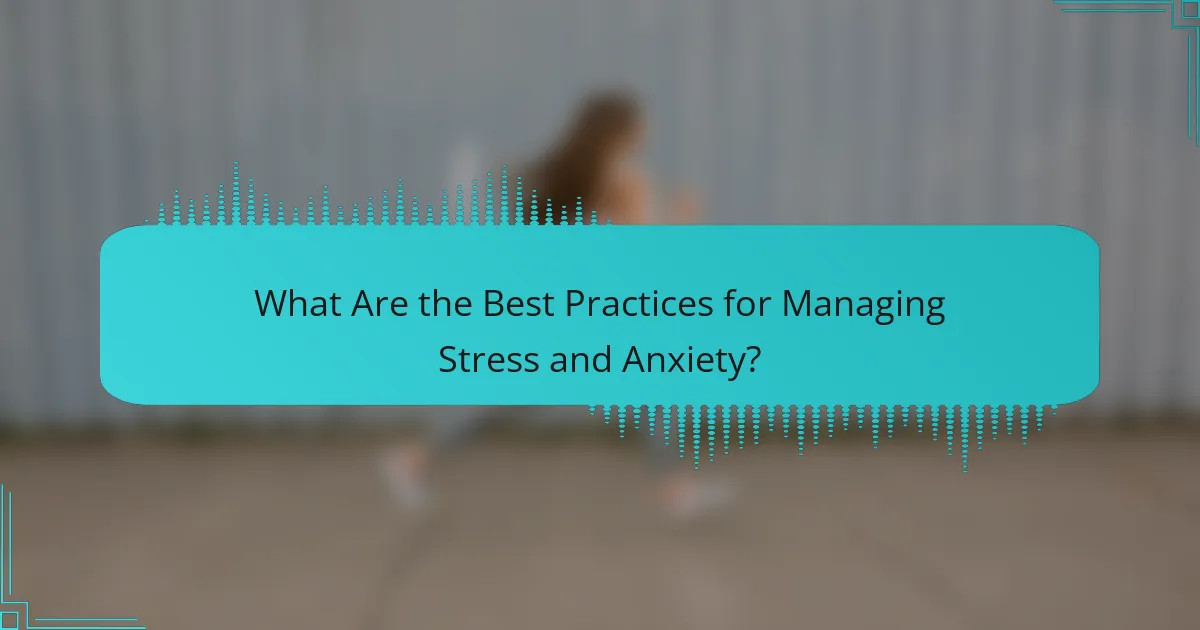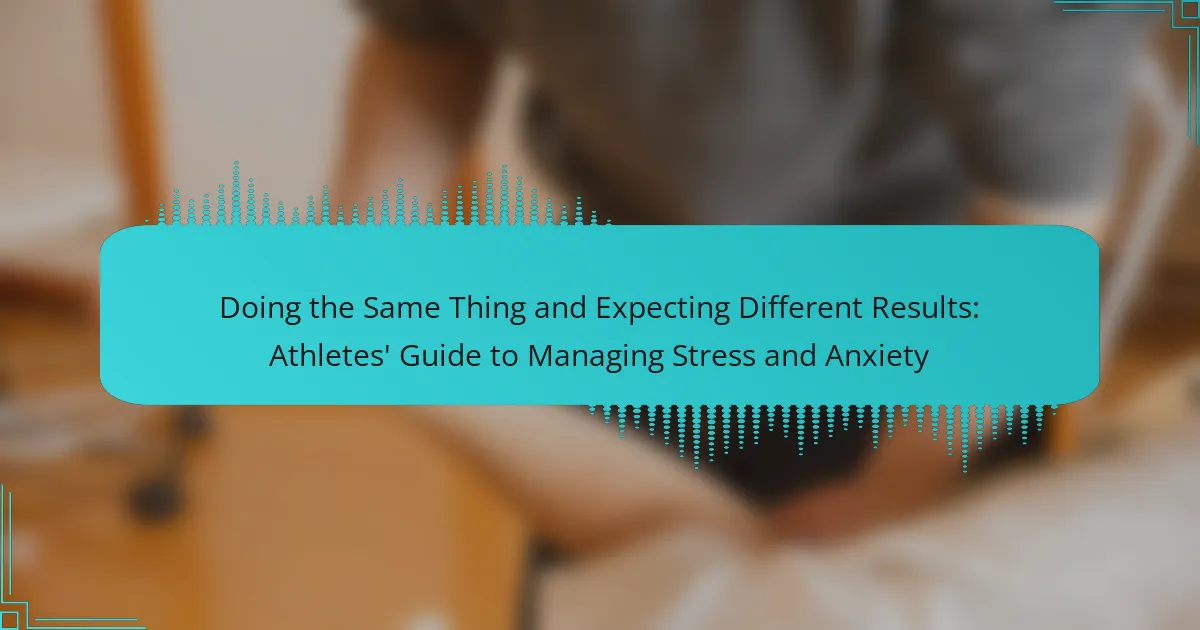Managing stress and anxiety is crucial for athletes seeking optimal performance. Recognizing physical and emotional signs of stress is the first step. Effective coping strategies include mindfulness techniques, structured routines, and open communication. Building a strong support system and avoiding ineffective management habits are essential for fostering mental resilience.

How Can Athletes Recognize Stress and Anxiety?
Athletes can recognize stress and anxiety by monitoring physical and emotional signs. Common indicators include increased heart rate, muscle tension, irritability, and changes in sleep patterns. Awareness of these symptoms allows athletes to implement coping strategies effectively. Regular self-reflection and mindfulness practices can enhance this recognition process.
What Are the Common Signs of Stress in Athletes?
Common signs of stress in athletes include increased anxiety, changes in sleep patterns, and decreased performance. These symptoms can manifest as irritability, fatigue, or lack of focus. Recognizing these signs is crucial for effective stress management. Athletes should monitor their mental health and seek support when needed to maintain optimal performance.
How Does Anxiety Manifest in Athletic Performance?
Anxiety can negatively impact athletic performance by causing distractions, reducing focus, and impairing physical coordination. Athletes may experience symptoms like increased heart rate, muscle tension, and fatigue, which hinder their ability to perform optimally. Effective stress management techniques, such as mindfulness and visualization, can mitigate these effects and enhance performance.

What Are the Universal Coping Strategies for Athletes?
Athletes can effectively manage stress and anxiety through universal coping strategies. These include mindfulness techniques, structured routines, and open communication with coaches and teammates. Mindfulness practices, such as meditation, enhance focus and reduce anxiety. Establishing a consistent training routine helps create a sense of control. Additionally, discussing feelings and challenges with trusted individuals fosters support and understanding. Implementing these strategies promotes mental resilience and optimal performance.
How Can Breathing Techniques Help Manage Stress?
Breathing techniques can significantly reduce stress by promoting relaxation and enhancing focus. These methods regulate the body’s response to stress, lowering heart rate and blood pressure. For athletes, controlled breathing improves performance under pressure. Research indicates that deep breathing exercises can decrease cortisol levels, a hormone linked to stress. Regular practice of these techniques fosters resilience, enabling athletes to manage anxiety effectively.
What Role Does Physical Conditioning Play in Reducing Anxiety?
Physical conditioning significantly reduces anxiety by enhancing physical health and mental resilience. Regular exercise releases endorphins, which improve mood and alleviate stress. Studies show that athletes often experience lower anxiety levels due to their training routines. Engaging in physical activities can also create a sense of accomplishment, further mitigating anxiety symptoms.

What Unique Techniques Can Athletes Use to Tackle Stress?
Athletes can use mindfulness, visualization, and breathing techniques to effectively tackle stress. Mindfulness enhances focus and reduces anxiety by promoting present-moment awareness. Visualization helps athletes mentally rehearse performance scenarios, reducing pre-competition nerves. Breathing techniques regulate physiological responses, fostering calmness and clarity. These unique techniques empower athletes to manage stress and improve overall performance.
How Can Visualization Techniques Improve Performance Under Pressure?
Visualization techniques enhance performance under pressure by improving focus and reducing anxiety. Athletes can mentally rehearse successful outcomes, which builds confidence. This practice activates neural pathways similar to actual performance, facilitating better execution. Research indicates that visualization can significantly lower stress levels, enabling athletes to maintain composure during high-stakes situations.
What Are the Benefits of Mental Conditioning Coaches?
Mental conditioning coaches provide significant benefits for athletes managing stress and anxiety. They enhance focus, improve mental resilience, and develop coping strategies. These coaches help athletes maintain peak performance under pressure, which is crucial for competitive success. Additionally, they teach mindfulness techniques that promote relaxation and reduce anxiety levels.

What Rare Strategies Are Effective for Managing Anxiety?
Mindfulness techniques are rare yet effective strategies for managing anxiety in athletes. These practices help athletes focus on the present moment, reducing stress and enhancing performance. Techniques like deep breathing, body scanning, and visualization can significantly lower anxiety levels. Research shows that athletes who practice mindfulness report improved emotional regulation and resilience. Additionally, incorporating mindfulness into training routines fosters a positive mindset, essential for overcoming performance-related stress.
How Can Journaling Impact an Athlete’s Mental Health?
Journaling can significantly enhance an athlete’s mental health by providing a structured outlet for stress and anxiety. This practice allows athletes to reflect on their experiences, identify triggers, and develop coping strategies. Research indicates that regular journaling can reduce symptoms of anxiety by up to 30% and improve overall emotional well-being. By documenting thoughts and feelings, athletes can gain clarity and foster a positive mindset, ultimately enhancing performance.
What Role Does Nutrition Play in Stress Management?
Nutrition significantly influences stress management by providing essential nutrients that support mental health. A balanced diet rich in fruits, vegetables, whole grains, and lean proteins can enhance mood and reduce anxiety. Specific nutrients, such as omega-3 fatty acids and B vitamins, play unique roles in brain function and stress response. Consuming adequate hydration and avoiding excessive caffeine can further improve stress resilience. Athletes, in particular, benefit from tailored nutrition strategies to optimize performance and manage stress effectively.

How Can Athletes Create a Support System?
Athletes can create a support system by building strong relationships with coaches, teammates, and mental health professionals. These connections provide emotional backing and practical strategies to manage stress and anxiety effectively. Engaging in open communication fosters trust and collaboration, enhancing overall performance. Additionally, participating in support groups can offer shared experiences and coping techniques.
What Are the Key Components of a Strong Athletic Support Network?
A strong athletic support network includes coaches, teammates, family, and mental health professionals. These components provide emotional support, accountability, and guidance. Coaches offer strategic insights, while teammates foster camaraderie and motivation. Family members provide encouragement and stability. Mental health professionals help athletes manage stress and anxiety effectively. Each element contributes uniquely to an athlete’s overall well-being and performance.
How Can Communication with Coaches Reduce Anxiety?
Communication with coaches can significantly reduce anxiety in athletes by providing clarity and support. Open dialogue fosters trust, enabling athletes to express concerns and receive constructive feedback. This process helps in identifying stressors and developing tailored coping strategies. Regular check-ins create a sense of accountability and reassurance, which can alleviate feelings of isolation. Ultimately, effective communication equips athletes with tools to manage their anxiety, promoting better performance and well-being.

What Are Common Mistakes Athletes Make in Stress Management?
Athletes often make the mistake of using the same stress management techniques without assessing their effectiveness. This approach leads to stagnation and increased anxiety. Common errors include neglecting personalized strategies, failing to adapt to changing circumstances, and not seeking professional guidance. As a result, athletes may experience heightened stress and diminished performance. Recognizing these pitfalls is crucial for developing a more effective stress management plan.
How Can Overtraining Lead to Increased Anxiety Levels?
Overtraining can significantly increase anxiety levels due to physical and psychological stress. This occurs when athletes push their bodies beyond recovery, leading to fatigue, irritability, and heightened stress responses. Chronic fatigue disrupts hormonal balance, particularly cortisol, which is linked to anxiety. As a result, athletes may experience a cycle of stress and overtraining, exacerbating their mental health challenges. Addressing recovery and incorporating stress management techniques is essential for maintaining both physical and mental well-being.
What Are the Risks of Ignoring Mental Health?
Ignoring mental health can lead to severe consequences for athletes, including increased stress, anxiety, and decreased performance. Mental health issues may manifest as physical symptoms, impacting overall well-being. Athletes who neglect mental health risk burnout and diminished motivation. Research indicates that untreated mental health conditions can lead to long-term psychological damage. Prioritizing mental health is essential for maintaining peak performance and overall life satisfaction.

What Are the Best Practices for Managing Stress and Anxiety?
To effectively manage stress and anxiety, athletes should adopt proactive strategies that foster mental resilience. Techniques include mindfulness, proper time management, and physical conditioning. Mindfulness practices, such as meditation, enhance focus and reduce anxiety levels. Time management allows athletes to balance training and recovery, minimizing overwhelm. Regular physical conditioning not only improves performance but also releases endorphins, which alleviate stress. Engaging in support networks can provide emotional relief, while setting realistic goals fosters a sense of accomplishment.
How Can Setting Realistic Goals Help Athletes?
Setting realistic goals helps athletes manage stress and anxiety by providing clear, achievable targets. This approach fosters a sense of control and boosts motivation. Athletes who set specific, measurable goals experience reduced performance anxiety, as they focus on incremental progress rather than overwhelming expectations. Research indicates that goal-setting enhances self-efficacy, leading to improved mental resilience. By aligning goals with personal values, athletes cultivate a positive mindset, further mitigating stress.
What Techniques Can Athletes Use for Immediate Stress Relief?
Athletes can use techniques like deep breathing, progressive muscle relaxation, visualization, and mindfulness for immediate stress relief. These methods help reduce anxiety, enhance focus, and improve performance. Deep breathing lowers heart rate and promotes calmness. Progressive muscle relaxation releases tension in muscles, while visualization creates a mental image of success. Mindfulness encourages staying present, reducing overwhelming thoughts.
How Can Regular Reflection Improve Mental Resilience?
Regular reflection enhances mental resilience by fostering self-awareness and adaptive coping strategies. Athletes who engage in consistent reflection can identify stress triggers and evaluate their responses, leading to improved performance under pressure. This practice cultivates a growth mindset, enabling athletes to learn from setbacks and develop stronger psychological fortitude. Research shows that reflective practices can reduce anxiety and enhance emotional regulation, essential for maintaining focus during competitions.


